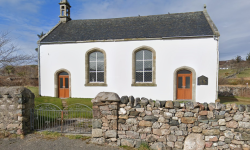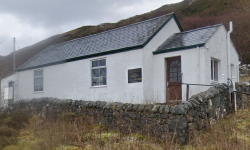William Sutherland was a missionary in the early days of the FP Church who was instrumental in establishing a congregation in Scourie.
From the Free Presbyterian Magazine, Nov. 1900, Vol 5(7): 267-269.
The late William Sutherland
Achmelvich, Lochinver.
WILLIAM SUTHERLAND was born at Durness in Sutherlandshire, on the 12th day of August, 1818. Both his parents were pious. At the age of eight years he began to pray outside in secret. Mental imaginary visions of a false Christ were presented to his mind. He used to pray with great fervour when he had this Christ before his mind; when not, he could not pray.
This continued for a considerable time. Dr. Kennedy went to Assynt to preach, and thither William Sutherland went from Durness to hear him. Before the Dr.’s sermon was finished he “set fire to these delusions.” Ever after this day he held Dr. Kennedy in the greatest esteem, and felt always much refreshed by his sermons. The time of his trials had come. His former delusions were gone and “the ten great guns of heaven were” he said “set against me.” All the curses in the 28th chapter of Deut., from the 16th verse onwards, were set in array against his guilty soul. He felt that he dared not take the name of the Most High into his lips to ask so much as a blessing on temporal mercies.
The Bible became a terror to him, he could not so much as open it. Godly John Munro, Durness, used to keep a prayer meeting in his own house. To this meeting he went one evening and arrived before any of the rest of the people. He sat on a bed in the room, and drew the curtains of the bed between himself and the people, so that they should not be able to read in his face what he felt in his heart. When the meeting ended he was still without relief or comfort. John did not allow him to go home that night, but went to bed along with him, and held him by the wrist till the morning. After this he went to a communion in the parish of Farr, and lodged in the house of that eminent Christian, John M‘Intosh. John did not take any notice of him till Monday.
When he went to say good-bye to him—John being confined to bed at that time—he said to him, “ Well poor fellow what brought you here ? ” He said “ I don’t know very well what brought me.” “Well then,” John said, “if you don’t know what brought you here, don’t you think you would have been better employed attending to your own duties at home?” At this William began to tremble visibly. When John noticed this he added, “Well poor fellow, follow you on and don’t give up, stupid as you are, anns an dotereachd a tha ann (i.e. in the doctering there is), but hold by the law and the testimony, and by and by the Lord will win you from the devil.”
At another communion in the same place he had a strong temptation that no man of his name and surname had ever been saved. On Monday, at the close of the service, one of the ministers repeated a note of one of the godly men of the past whose name was William Sutherland. That temptation of Satan was broken which gave him relief and some hope. Some time after this he went to winter sheep in Creich, and while there and alone in the wood God spake peace to his soul by these words:—
“Truth met with mercy, righteousness and peace kiss’d mutually;
Truth springs from earth, and righteousness looks down from heaven high.”
So great was the joy that now filled his soul that he felt as if trees, shrubs, and all the material creation leapt for joy along with him. He often remarked in after life that no man had been instrumental in his conversion; neither when the terrors of the law took hold of his mind, nor when the Lord spake peace to his soul. He found some ministers very useful to him afterwards. At this time when his day’s work was ended, he used to spend a considerable time in private prayer outside before going home to his lodgings, and then instead of going to bed at the proper time, he used to sit up searching the Scriptures till the early hours of the morning, until his strength was greatly reduced.
His first wife was a godly young woman named Effy Rose, who was a help and comfort to him until the Lord saw fit to take her from him to be with Himself. After his marriage he went to Skye, to the parish of Duirnish. The first Sabbath after his arrival there, he records: “At mid-day about twelve lads came to our house to mis-spend the time. I went out and rebuked them for Sabbath breaking. One of them took up a small stone, and threw it at me, I heard the hiss of it passing my ear. I said nothing to him, but told them all never to come back again on a Sabbath day to my house, which they never did. They used to spend the Sabbath day on a green knoll in the midst of the township; but there was one Lot in Sodom, a godly schoolmaster. We began to keep a meeting every Sabbath. Shortly after this, the late eminent Rev. Mr. M‘Coll came to Duirnish, and before I left the place, the most of the houses in that township held family worship, and some of the men were called upon to pray in public.
My first child — a girl — died at the age of four years, of croup. From what I observed in that child, I have a good hope that the Lord wrought savingly in her soul. I was for eighteen years there, under the ministry of Mr. M‘Coll At one of the communions held there at that time, when I was sitting at the Lord’s table, and when the elements were being put round, that passage of the Word came with much power to my mind, “ Behold the Lamb of God that taketh away the sin of the world.” I got such a fill of the love of Christ that I could not face the congregation when they dismissed, but went away to spend the time in the fields till the evening service began.”
He left Skye and came to live at Lochinver, where he exercised his office as a catechist. He was among the first that joined in holding the distinctive principles and doctrines of the Church of Christ in Scotland, when the Free Church, so called, threw them away in 1893, and when the Free Presbyterian Church was formed out of its ruins.
He was at the last communion held at Lairg, and, though very frail, was able to attend the public meetings both on Friday and Sabbath during the whole services. On Friday he spoke a few words to the question. He said, “ The Lord’s people, if I know anything, are like the kine in Pharaoh’s dream they had seven fat years, but the seven lean ones that came after did eat up the fat ones, and it is not known on them that they did eat them.” He left Lairg to go to Scourie, where he arrived, though very weak, in a happy state of mind. He died there on the 4th of September, and was buried at Lochinver on the 7th. This eminent man had reached the ripe age of 82 years. “There remaineth therefore a rest to the people of God.”
Much sympathy is felt for his widow and family by a very wide circle of friends, both in the north and south.
N. C. [Rev Neil Cameron].

